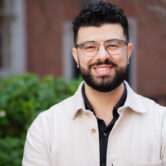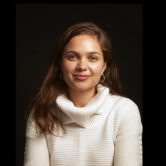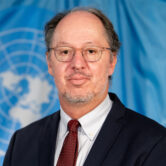
Youssef Farhat
Executive Director

Victoria Adelmant
Director, Digital Welfare State & Human Rights Project
Technology and Human Rights
Victoria Adelmant leads the Center’s work on technology and human rights as the Director of the Digital Welfare State and Human Rights Project. She is also an Adjunct Professor at NYU Law, where she teaches courses relating to emerging technologies and digitalization.
Her research focuses on how the digital transformation of the state – particularly those parts of the state with which low-income and marginalized groups most interact, such as welfare services – impacts human rights. From the shifting of government services online, to digital ID, to financial technologies and biometrics, her research explores the exclusions which are arising as digital technologies are introduced into state services. She is currently co-authoring a book with Christiaan van Veen and Philip Alston on these topics.
Victoria previously worked for the International Human Rights program of the Oak Foundation and at Minority Rights Group International. She has long sought to combine her experience in international human rights organizations with work within grassroots organizations: she has worked with the United Nations, the European Commission and the Academy of European Law, and has advised asylum-seekers and migrants within service organizations in the United Kingdom and campaigned with Oxfam.
Victoria holds an LLM in International Legal Studies from NYU, where she was a Hauser Global Scholar and a Human Rights Scholar and won the Jerome Lipper Award and the David Moses Memorial Prize. She also holds an LLM from the London School of Economics (Distinction) and a BA in Law with German Law from the University of Oxford (First Class Honors).

Sienna Merope-Synge
Co-Director, Caribbean Climate Justice Initiative
Global Justice Clinic
Sienna Merope-Synge is the Co-Director of the Caribbean Climate Justice Initiative and the Director of the Indigenous Land Rights and Earth Defense project through the Global Justice Clinic. Both projects partner with communities and organizations on the frontlines of the climate crisis to defend their environmental, economic, social and cultural rights, and support efforts to secure land rights and build community power.
Sienna was previously the Legal Director at the Institute for Justice and Democracy in Haiti (IJDH), where she led the organization’s work seeking accountability for emblematic human and environmental rights violations in Haiti, including efforts to secure remedies for victims of the UN-introduced Haiti cholera epidemic and child support for victims of sexual exploitation by UN peacekeepers. She worked between New York and Port-au-Prince from 2015 to 2020 and speaks fluent French and Haitian Creole.
Sienna received her LLM from NYU School of Law in 2015, where she was a Hauser global scholar. She holds political science and law degrees with first class honors from the University of Melbourne, Australia.

Rob Lothman
Legal and Policy Director
Prevention Project
Rob Lothman is the Legal and Policy Director of the Prevention Project, where he orchestrates project strategy, research and program administration, cross-workstream initiatives, and development of the prevention framework.
Prior to joining the Prevention Project, Rob worked in a range of legal, policy, teaching, and business contexts around the globe. As a Global Public Sector Marketing Manager with Cisco Systems, Rob led strategic marketing efforts for a multibillion-dollar global education portfolio, promoted CSR programs expanding access to education, and managed partnerships with governments, universities, and NGOs. At Shrewsbury School, Rob served as Peter J. Gomes Fellow, teaching English, history, philosophy, and social science research methods and developing course modules on transitional justice, human rights, and political repression. Rob also researched nuclear nonproliferation and disarmament at a Moscow-based NGO.
Rob is a licensed attorney in Massachusetts, and he holds a J.D. from the University of Michigan Law School, where he studied intersections between human rights, transitional justice, and constitutional law. Rob received his A.B. in Social Studies and a Minor in Russian from Harvard University, where he studied political repression and mass human rights abuses in the Soviet Union.

Pablo de Greiff
Senior Fellow; Director
Prevention Project, Transitional Justice Program
Pablo de Greiff directs the Transitional Justice Program and the Prevention Project at the Center. He served as the first UN Special Rapporteur on the promotion of truth, justice, reparation, and guarantees of non-recurrence from 2012 to 2018, as a member of the UN Independent Investigation on Burundi (UNIIB) in 2015-16, and since 2019 serves in the UN Secretary General’s Civilian Advisory Board.
From 2001 to 2014, Pablo was the Director of Research at the International Center for Transitional Justice. Born in Colombia, Pablo graduated from Yale University (BA) and from Northwestern University (PhD). Before joining the ICTJ, he was an associate professor with tenure in the Philosophy Department at the State University of New York at Buffalo, where he taught ethics and political theory. He was also a Laurance S. Rockefeller fellow at the Center for Human Values at Princeton University and held a concurrent fellowship from the National Endowment for the Humanities.
Pablo is the editor or co-editor of ten books, including Jürgen Habermas’s The Inclusion of the Other (MIT Press, 1998), Global Justice and Transnational Politics (MIT Press, 2002), Las Razones de la Justicia: A Festschrift for Thomas McCarthy (México: UNAM, 2006), and in areas related to transitional justice, The Handbook of Reparations (Oxford, 2006), Transitional Justice and Development: Making Connections (SSRC, 2009), and Disarming the Past: Transitional Justice and Ex-combatants (SSRC, 2010), among others.
Pablo has published extensively on transitions to democracy, democratic theory, and the relationship between morality, politics, and law, and is on the board of editors of the International Journal of Transitional Justice and of several book series related to the topic. His articles include “Theorizing Transitional Justice,” in Transitional Justice, NOMOS, vol. LI, Melissa Williams, Rosemary Nagy, and Jon Elster, eds. (NYU Press, 2012).
He has lectured at NYU, Yale, Harvard, Columbia, Cornell, European University Institute, and in universities across Europe and Latin America.
Pablo contributed to the drafting of the final report of the Stockholm Initiative on DDR, authored the Office of the High Commissioner for Human Rights’ Rule-of-Law Tools for Post-Conflict States: Reparations Programmes, and was an adviser to the World Bank on the process leading to the World Development Report 2011: Conflict, Security, and Development. He has been an adviser to different transitional justice bodies in Peru, Guatemala, Morocco, Colombia, and the Philippines. He is the Chair of the Advisory Board of the Open Society’s Justice Initiative, and a member of the advisory boards of the International Center for Transitional Justice, the Archives and Dealing with the Past Project, and a member of the boards of the Global Survivor’s Fund, the Universal Rights Group, and of the International Center for MultiGenerational Legacies of Trauma.
During his term as Special Rapporteur, Pablo conducted country visits to Uruguay, the United Kingdom and Northern Ireland, Tunisia, Spain, Burundi, Sri Lanka and presented over a dozen reports to the UN Human Rights Council and the UN General Assembly.

Mikhal Shachar
Prevention Project
Policy & Program Manager
Mikhal Shachar joined the Prevention Project in June 2022, after graduating from the NYU School of Law in May 2022 with an LL.M. in International Legal Studies.
As Policy & Program Manager, Mikhal manages the Constitutional and Legal Tools, Security, Civil Society, and Environment workstreams. During her LL.M., Mikhal was a Human Rights Scholar with the Prevention Project.
Between 2017-2021, Mikhal was a legal advisor at the Israeli Ministry of Justice Office of Deputy Attorney General for International Law. She held positions on the Policy and Strategy team and the Foreign Litigation team, where she drafted Israel’s legal position on issues of international law, universal jurisdiction, cyber governance, state immunity, and business and human rights. Mikhal also managed civil litigation and criminal complaints against Israeli officials abroad. Mikhal holds an LL.B. in Law and Political Science from Tel-Aviv University.
During her LL.B. Mikhal was a research and teaching assistant to a number of leading Israeli international law scholars. Prior to law school, Mikhal served as a shift-commander NCO in the Foreign Liaison Department of the Israel Defence Force where she conducted strategic and tactical cooperation with neighboring foreign militaries and U.N. forces. After being admitted to the Israeli Bar Association, Mikhal took on a Staff Sergeant reserve position at the International Law Department of the Military Advocate General.

Michelle Lobo
Supervising Attorney
The Earth Rights Research & Action

Melina De Bona
Supervising Attorney
The Earth Rights Research & Action

Katelyn Cioffi
Senior Research Scholar, Digital Welfare State and Human Rights Project
Technology and Human Rights
Katelyn Cioffi is a Senior Research Scholar at the Center, where she works on the Digital Welfare State and Human Rights Project and leads the project’s work on digital identity systems. Katelyn’s research focuses on how digital government initiatives—such as biometric national digital ID systems, federated identity ecosystems, and legal and regulatory frameworks for emerging technologies and artificial intelligence—affect human rights, social exclusion, and inequality.
Katelyn has experience working across a wide range of human rights issues, including social and economic rights, freedom of expression, gender-based discrimination, and international justice. Prior to coming to CHRGJ, she worked in the Strategic Litigation Unit at Amnesty International, where she supported human rights litigation in the United States, the European Court of Human Rights, and the Inter-American Court of Human Rights. She has worked extensively with civil society organizations around the world on issues of transitional justice, human rights, monitoring & evaluation, and capacity building.
From 2018–19, Katelyn was a Fulbright Fellow at the Amsterdam Center for International Law, University of Amsterdam, where her research focused on the doctrine of emerging consensus and its effect on contestation in regional human rights systems. She holds a JD from Harvard Law School (cum laude), an MA in International Studies and Diplomacy from the School of Oriental and African Studies at the University of London, and a BA in History from Brown University. Katelyn is admitted to practice law in the State of New York.

Katarina Sydow
Senior Advisor to UN Special Rapporteur on the Independence of Judges and Lawyers
Katarina Sydow is the Senior Advisor to the UN Special Rapporteur on the independence of judges and lawyers, Professor Margaret Satterthwaite.
Katarina was previously Director of the Human Rights and Privatization Project at the Center, where her research focused on poverty and inequality, and the human rights impacts of commodifying essential services such as healthcare, water and education.
Katarina has a broad interest in international law and human rights issues. She has worked as a consultant for UN Women and the United Nations Development Programme, contributing to policy briefs concerning the Women, Peace and Security agenda and the Global Focal Point for the Rule of Law. Katarina was also an NYU International Law and Human Rights Fellow at the United Nations Department of Peace Operations, Justice and Corrections Service.
Before moving to the United States, Katarina worked as a barrister in the UK for eight years, where she was ranked in Legal 500 and Chambers and Partners. She specialized in public law, human rights and medical law.
Katarina holds an LLM in International Legal Studies from NYU, a Graduate Diploma in Law from City, University of London, and a BA in Modern History from the University of Oxford. At NYU, she was an Arthur T. Vanderbilt Scholar and the recipient of the Jerome Lipper Award for International Legal Studies and the Howard Greenberger Award for comparative law.
Created by Matchbox Creative
New York University School of Law | Center of Human Rights and Global Justice | Accessibility | All rights reserved. © 2024